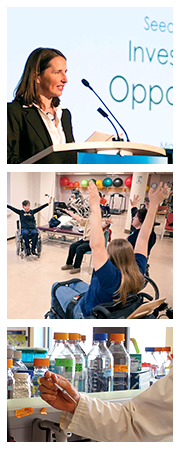Praxis Model
/ˈpraksɪs/ n.
The process by which a theory, lesson or skill is enacted, embodied or realized.
The challenge
In Canada, the cost of care for people with traumatic SCI is now estimated at approximately $2.7 billion per year. Despite the amount of funding that supports basic research, only 14% of health-related scientific discoveries enter into medical practice; and it takes an average of 17 years for this to occur. The transfer of knowledge from bench- to-bedside is so fraught with obstacles that the transitions between discovery and implementation are often referred to as “valleys of death”.
The solution
In response to these challenges, RHI has implemented a solutions-focused model, Praxis, to overcome specific obstacles to improve healthcare outcomes for individuals with SCI and to reduce the long-term financial impact on the healthcare system.
RHI’s Praxis model consists of three essential components (as seen in the diagram below). This unique combination of the component areas and RHI’s role as a champion of change puts RHI at the forefront of innovating cost-effective, transformational change in the lives of individuals with SCI as well as their families, caregivers and loved ones.
The benefits
The Praxis Model enables RHI to achieve a better return on investment for our funders than in other models. We define ROI as improved outcomes for people with SCI divided by the cost of improved outcomes.
To learn more about Praxis, including feedback from leading experts in the field, click here.

